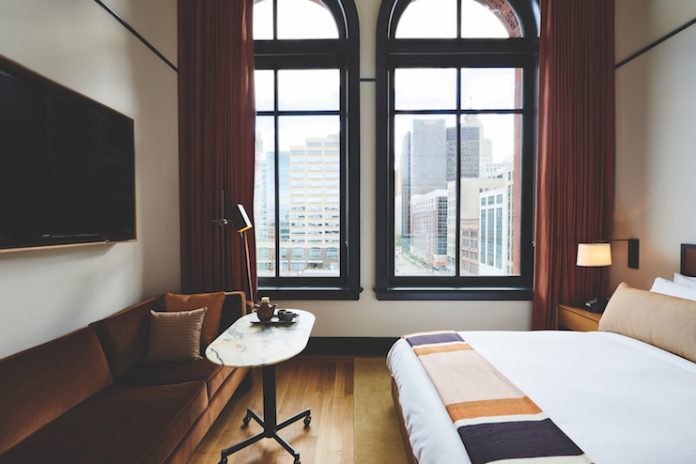
Ideation of a completely new hospitality brand concept or program can be an expensive and labor-intensive process. However, guests are always searching for the next exciting hotel concept and there’s always room in the industry for great new ideas.
Yet, there is a middle ground. Many hospitality experts have realized that the best way to increase guest buy-in on a new vision is to rely on pre-existing brand equity and love through partnerships and brand expansions, rather than starting from a blank slate.
Founded in 2011, Shinola has been a mainstay in the luxury goods space, with strong ties to and roots in its hometown of Detroit. After much anticipation, the new Shinola Hotel opened in downtown Detroit in January, highlighting not only the brand’s goods but its longstanding connection to the city. Importantly, there’s a lot more to the hotel concept than watches, bicycles, and built-to-last leather goods. The aesthetic, service culture, and food and beverage offerings are rooted in—and expand upon—Shinola’s reputation for tactile quality, warmth, and taste. This addition to the market may not have had the same chance to thrive without the Shinola name attached to it.
Aligning Hotels With Furniture and Homegoods Brands
Furniture designers and studios are a natural fit for brand expansion in the hospitality space. Both West Elm and Restoration Hardware have projects in the pipeline that seek to leverage their existing brand equity and display their products in new hotel spaces. Consumers know and love these brands. There’s no reason to think that they won’t successfully realign and expand via hotels, but a hotel is about much more than furniture and design. These brands must address the critical elements of guest experience and service to avoid becoming furniture showrooms where guests pay to sleep.
West Elm plans to extend its in-store commitment to community connections and the uniqueness of place with local programming and significant location-focused differences in design and F&B offerings. Details are still crystallizing on Restoration Hardware’s plans, but it’s safe to assume that the standalone hotel will offer more than an expansion of its hotel bedding collection. With ‘mansions’ that operate several million-dollar annual F&B outlets already in operation, an expansion into a greater touch-point hotel offers is a logical next step.
Apparel, iconic lifestyle, and consumer tech brands are right behind the furniture players—expect to see new offers in this space in the medium term.
Partnerships Are ‘Stepping-Stone’ Into the Hotel Space for Retail Brands
Launching a new hotel brand isn’t the only way for an existing product or service to leverage its brand equity in hospitality. Consumer brands are now thinking about ways to extend their offerings through partnerships. This is more than product placement—it’s thoughtful integration of complementary brand concepts where the whole is greater than the sum of its parts.
Some great examples include: Canyon Ranch Spa + Fitness offerings on Celebrity, Cunard, Oceania, and Regent Seven Seas cruise lines to provide a recognizable and curated wellness experience; HotelTonight’s partnership with Madison Square Garden and Tao Nightclubs to provide a solution for a night on the town; and the James Beard Foundation’s association with Windstar Cruises, driving menu and wine offerings, as well as guest chef appearances from James Beard Foundation award-winning restaurants. The common thread in all of these examples is the opportunity for guests to continue consuming brands they know and love in new spaces and in new ways, which, in turn, drives stronger connections with both the brands and the properties.
Benefiting from Brand Expansions and Partnerships
Brand expansions and partnerships can have a leg up on new concept development in at least two ways. First, they take advantage of existing brand equity—including social platforms and influence—rather than seeking to develop a following from scratch. Second, the existing “bones” and ethos of a brand can serve as strong guiding principles to establish the contours and touchpoints of the extension concept.
Partnerships and brand extensions offer the opportunity for success in a new venture, as well as bolster consumer love for the original product or service. That said, it’s not always a walk in the park for hoteliers or those jumping into the business, as they must consider both distribution and loyalty. Based on the market, target customer, and other considerations, hoteliers should evaluate partnerships and licensing opportunities against traditional hotel company deals.
Hotel developers looking to break from the big-brand mold may find licensing and partnerships to be the next frontier in branding. The industry can expect continued growth in this space. Keep an eye out for the next wave of brand extensions into hotels in 2019. Who will it be? What will they offer? And what will give them a competitive advantage?









